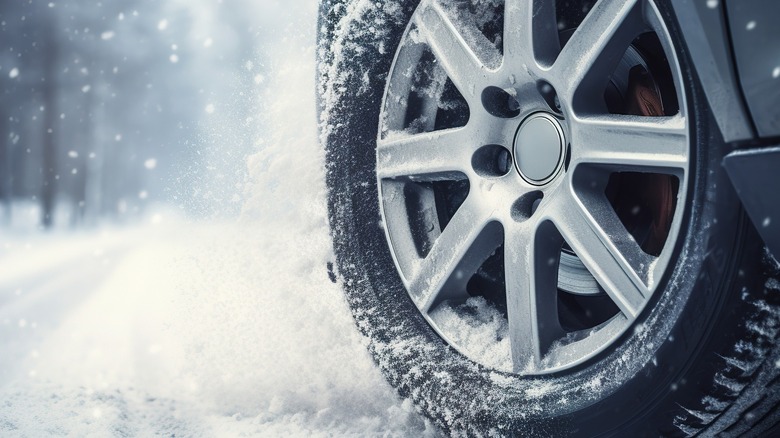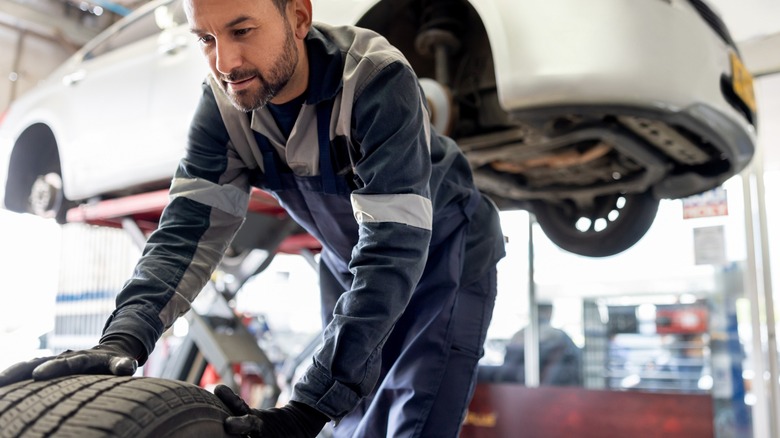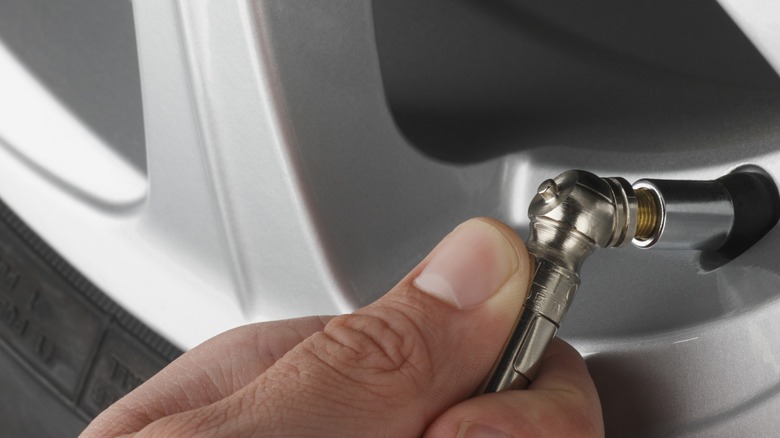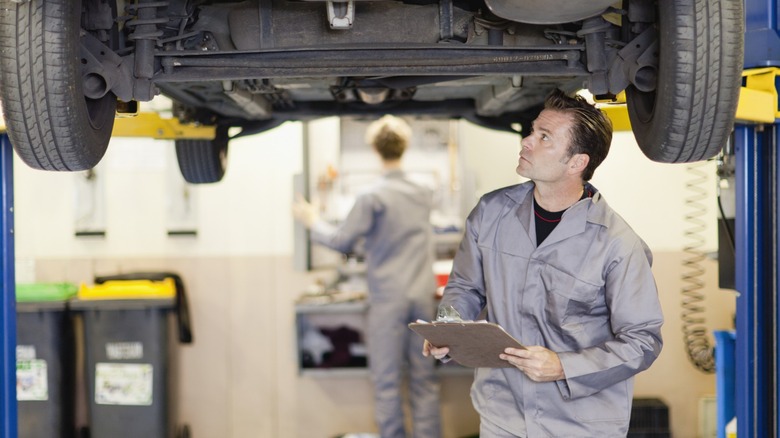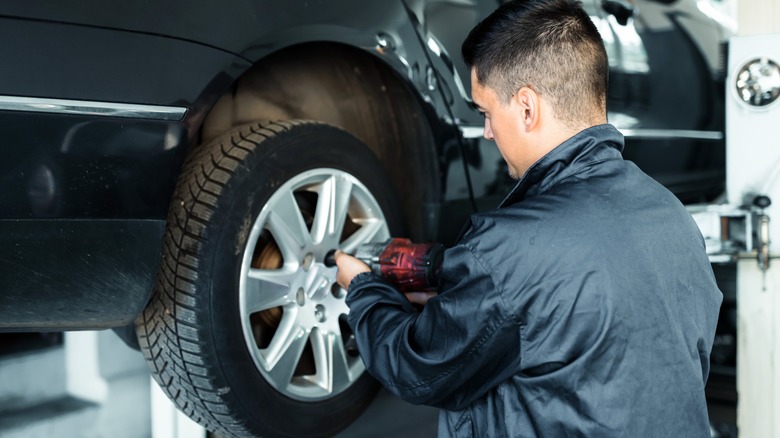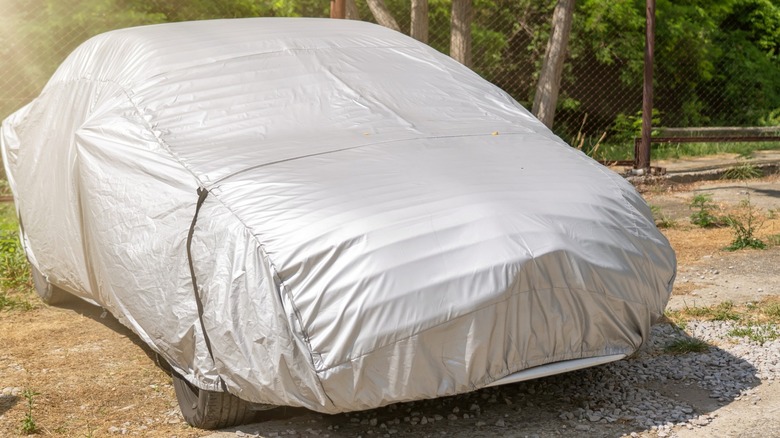5 Ways To Make Your Tires Last Longer
Every car part is important, but your tires are particularly so because of their safety implications. In the rain or in the snow, tires in good working condition ensure you don't slide off the road. And when you need to brake suddenly, your tires play a huge part in how quickly you come to a stop.
Replacing car parts when they go bad can be pretty expensive. While you should never compromise on your safety or that of other drivers, there are ways to maintain your car tires so that they last longer and you don't have to worry as much about shelling out cash for expensive replacements.
Good tires, if well-maintained, can last you about four years, according to Dan Zielinski of the U.S. Tire Manufacturers Association (via Car and Driver). The number could be higher or lower, depending on how and where you drive and the quality of your tires. Ideally, though, tires shouldn't be a car part that you replace yearly. So, let's get into all the things you should be doing to take care of your tires so they serve you for a long time.
Use the right tires and drive carefully
It's always important to use the right tires and drive with care. You might be indulging in terrible driving habits that are slashing your tires' lifecycle and affecting your car's overall performance.
If you're rough in your handling, steering, and stopping, occasionally hitting the curb at high speed, running into bumps and potholes, or driving on the shoulder or rocky terrain with the wrong tires, you'll start to see signs you need to replace your tires with new ones pretty soon. With that in mind, be cautious when accelerating or braking. Watch out for potholes and ditches and avoid them if you can. When parking, do so carefully and avoid hitting the curb, which can damage your tires' sidewalls.
Another thing you should pay attention to is the type of tires fitted to your car. If it's a set of all-season or all-terrain tires, then you have a lot more leeway. However, if you have summer tires or winter tires, using either set in the wrong season can cause them to deteriorate quickly.
Check your pressure every month
The more often you drive, the more likely it is for your tire pressure to reduce over time. The wrong amount of pressure in either direction can mess with the tire's structure, and having too much or too little can also affect your car's performance.
If your tires don't have enough air pressure, you'll consume more fuel. If there's too much pressure, your car may struggle to brake, accelerate, or turn efficiently. That can easily lead to a blowout, or worse, a serious accident.
How often should you be checking your car tire's pressure? You don't have to wait until one of your tires is flat or there's a warning light on your dashboard to start paying attention. It's generally recommended that you check your tire pressure at least once every month and before embarking on a long road trip. That way, you can rest easy knowing that one important safety concern is taken care of.
Check alignment and keep your wheels balanced
Without proper alignment, your tires may wear out faster than they should. Usually, this will occur unevenly because your tires have an unusual tilt or wiggle to them, so the tread could be smooth on one side and rough on another.
This also involves the steering and suspension. Bad alignment often means that the suspension parts, like the tie rod, have an issue. This could be the result of hitting the curb too many times or driving on bad, uneven roads. It's important to watch for signs that your wheels need an alignment.
Additionally, when your wheels aren't properly balanced, there's an uneven distribution of weight, which can further affect your suspension and tires. When you visit an auto shop, they might offer you balancing and alignment services in one package. This addresses two different areas of your car and plays a significant role in keeping your wheels, suspension, and tires in good condition.
Rotate your tires
Most tire manufacturers recommend rotating your tires every 5,000 to 8,000 miles or so. This involves swapping your tires so that the ones at the front go to the back, the ones on the left go to the right, or both. A professional mechanic can help you figure out the pattern that makes the most sense for the type of car you drive.
Rotating your tires every six months (or whenever you go in for an oil change) will help even out the wear on your tires and make them last longer. But you should consult your owner's manual to be sure what frequency your particular car manufacturer prescribes.
If you don't rotate your tires regularly, it not only affects your tires but your car's performance as well. You might start to experience drifting and some other major problems with the handling, so this is a part of your car's maintenance you shouldn't neglect.
Park where there's shade
NHTSA research shows that tires age more quickly in warmer temperatures. Constant exposure to sunlight affects your tires more than you might think, so be mindful about where you park. A garage is perfect, but if you don't have one, try parking where there's some shade. You can also create your own shade by using a car cover or getting dedicated tire covers.
It's also important to keep your tires clean. When washing your car, don't neglect them. This helps to keep them in good condition. Another thing to remember is that even the most careful drivers still get flat tires. When you do, try to get it repaired properly. Not fixing it correctly degrades your tires and could result in a blowout. If the tire is damaged beyond proper repair, have it replaced.
It's important to make sure that your car and all of its parts are in good condition. That way, your car's performance stays optimal, and you and other drivers remain safe.
